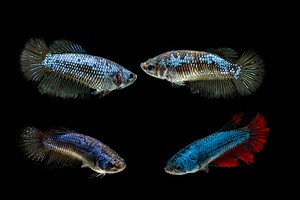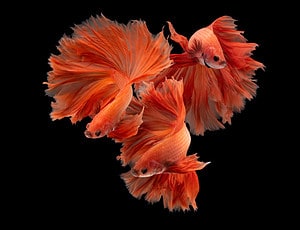Most people have owned a pet fish, with betta fish being the most popular species. A common question many owners ask themselves is if their fish ever sleep. Have you ever wondered if your pet fish is sleeping, or pondered how to tell when they are? Well, you have come to the right place! In this article, we will explore some of the best ways you can tell if fish are asleep.
To begin, almost everyone in the world has heard of or seen betta fish (Betta splendens) before. Whether it was in a cup at the pet store, zooming through your local tropical waterways, or even just in pictures, there is no debating how beautiful these fish are. Currently, there are over 73 recognized species of betta fish in the world. These flamboyant fish feature vibrant, sparkling colors of just about every shade in the rainbow. Plus, their fanning tails are sure to catch your eye, no matter what environment you see them in.
Having said that, there are three main species of betta fish that people typically keep as pets. These include halfmoon bettas, veil-tail bettas, and peaceful bettas, which are also called crescent bettas. If you plan on keeping these fish as pets, you might want to know the best ways you can tell fish are asleep. Now, let’s explore the world of betta fish to determine how to tell if your betta fish is sleeping!
Why do Betta Fish Sleep?

Betta fish like to sleep atop large, flat leaves or at the bottom of the aquarium. While they prefer leafy resting spots, they might also sleep on a flat rock or tank accessory.
©Arunee Rodloy/Shutterstock.com
While asking why anything sleeps might seem like a silly question, it is entirely a valid one to ask! To start, fish do not technically sleep in the same way that land mammals do, but all fish do take part in periods of rest. Betta fish specifically use this time of “suspended animation” to conserve their energy and allow their bodies to rest. They require periods of restful sleep to maintain their overall health and well-being. Sleeping also allows their bodies to repair and regenerate any damaged or old tissues. Besides that, resting also helps them process information from their environment and maintain a balanced internal state.
#8 Time of Day

Most pet stores and markets keep various betta fish in small tanks or cups for sale. However, these tanks are often not optimized for maintaining proper light-dark cycles.
©Suparna Hazra/iStock via Getty Images
Betta fish are a diurnal species, like (most) humans, meaning they are most active during the day and tend to sleep at night. Because of this, leaving the aquarium light on all day and night can deprive your betta fish of adequate sleep. This is especially true as they rely on external stimuli to know when it is nighttime. They are also very light sleepers. Nevertheless, leaving them in dark environments for extended periods of time is also not healthy, as it can cause them to become less active or even depressed.
#7 Minimal Gill Flaring
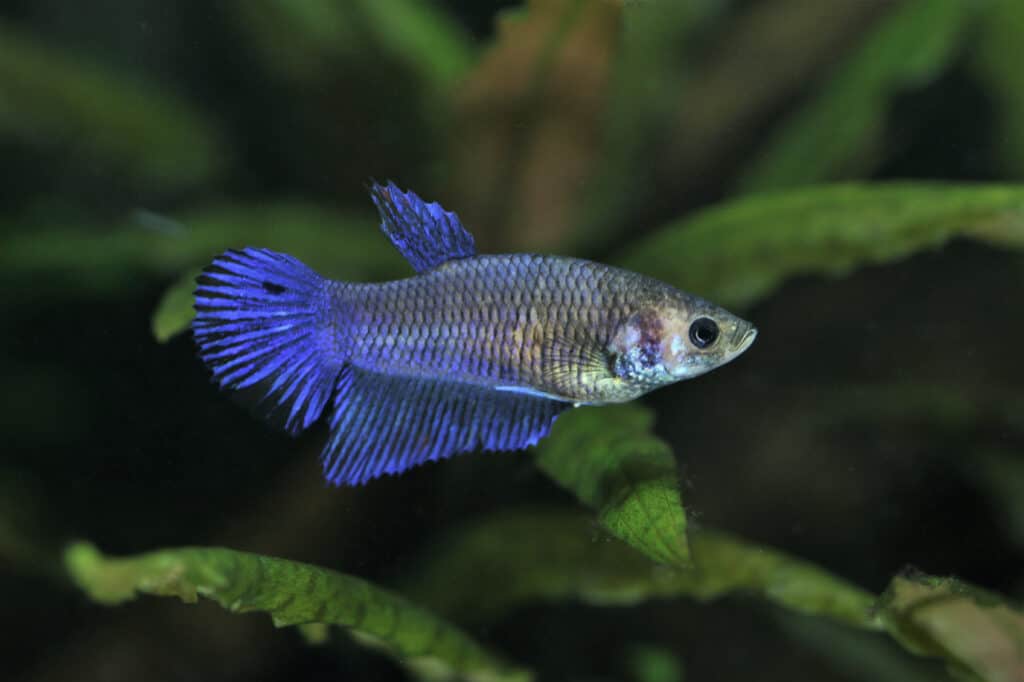
Betta fish are labyrinth fish, which refers to any fish species that have the unique ability to breathe oxygen directly from the air. They also obtain oxygen from the water, too.
©Arunee Rodloy/Shutterstock.com
Like the majority of fish species, betta fish absorb oxygen from the water through their gills. Besides that, betta fish flare their gills for a variety of other reasons as well. One of the most frequent reasons for gill flaring is to display aggression or territorial behavior. It is also used as an instinctive threat display. Along with that, gill and fin flaring enable betta fish to appear larger. This helps attract mates or ward off possible predators. Alternatively, they might flare their gills to indicate stress or fear. If your betta fish is excessively flaring their gills, or if they look inflamed or spotted, it can be a sign of poor water quality.
Although gill flaring is a normal and healthy behavior, it can also be used to determine if your betta fish is sleeping. This is because when they are at rest, this behavior naturally ceases to help them preserve energy. If you notice their gill flaring is reduced or absent, that is one of the many ways you can tell fish are asleep.
#6 Slowed Breathing Rate

©Shutterman70/Shutterstock.com
Along with reduced gill flaring, slowed breathing is another telltale sign that your betta fish is sleeping. During these resting periods, betta fish tend to have slower, shallower breathing patterns. While this might be difficult to observe, especially if you are new to keeping pet fish, it is possible. Additionally, checking on their gill movement can help you determine when they are breathing.
#5 Decreased Color Vibrancy
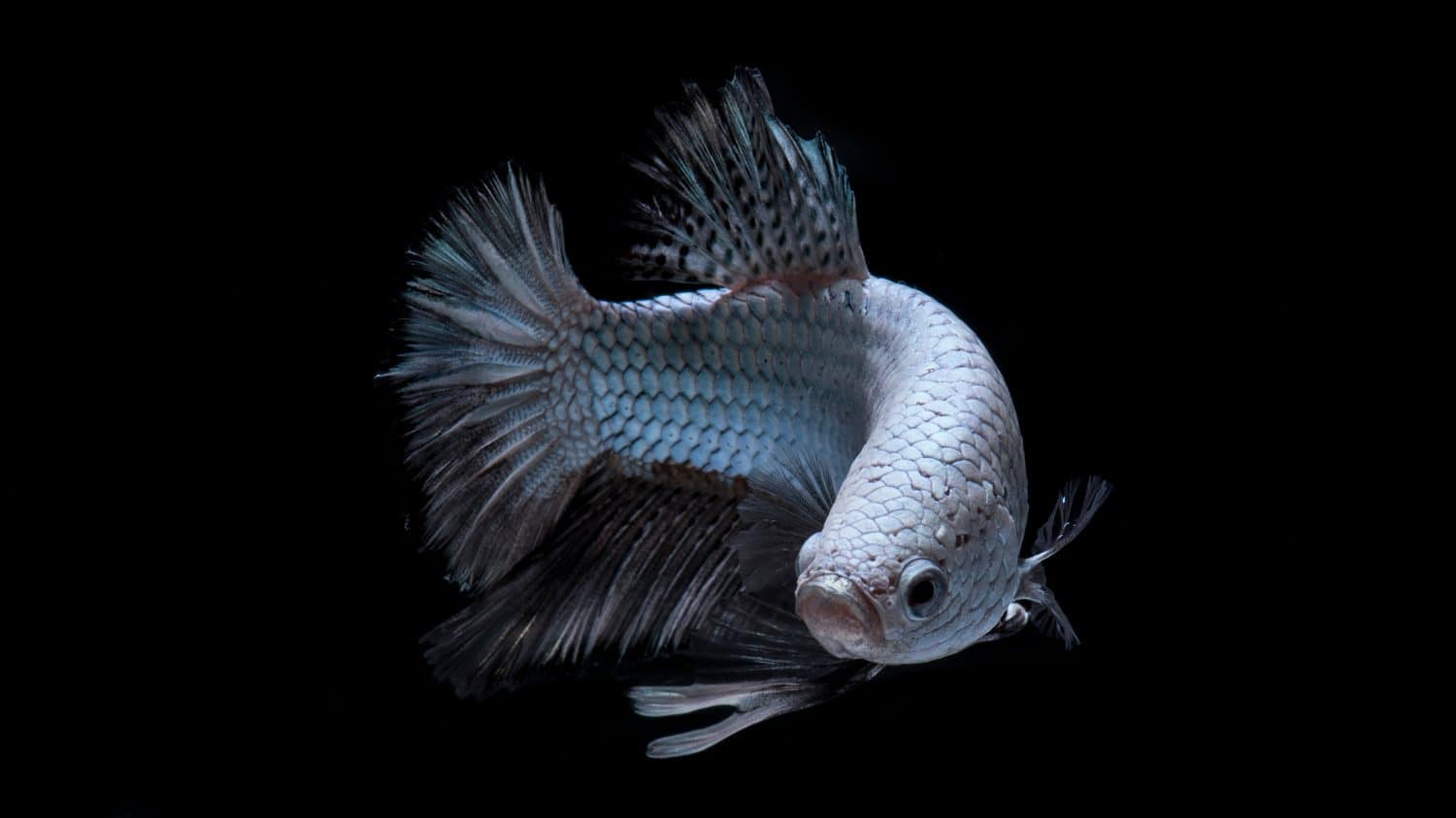
Betta fish are found in vibrant shades of red, blue, yellow, and white, though they come in many other colors, too!
©The Arielphoto/Shutterstock.com
Betta fish are some of the most vibrant, colorful fish species out there. That is why it might come as a shock to find out that there are times when they can actually look dull! One way you can tell your betta fish is sleeping is by examining its overall color, shine, and vibrancy. This is because the colors of a betta fish may appear slightly duller when they are asleep. While this change is typically subtle, it is definitely noticeable!
#4 Reduced Responsiveness
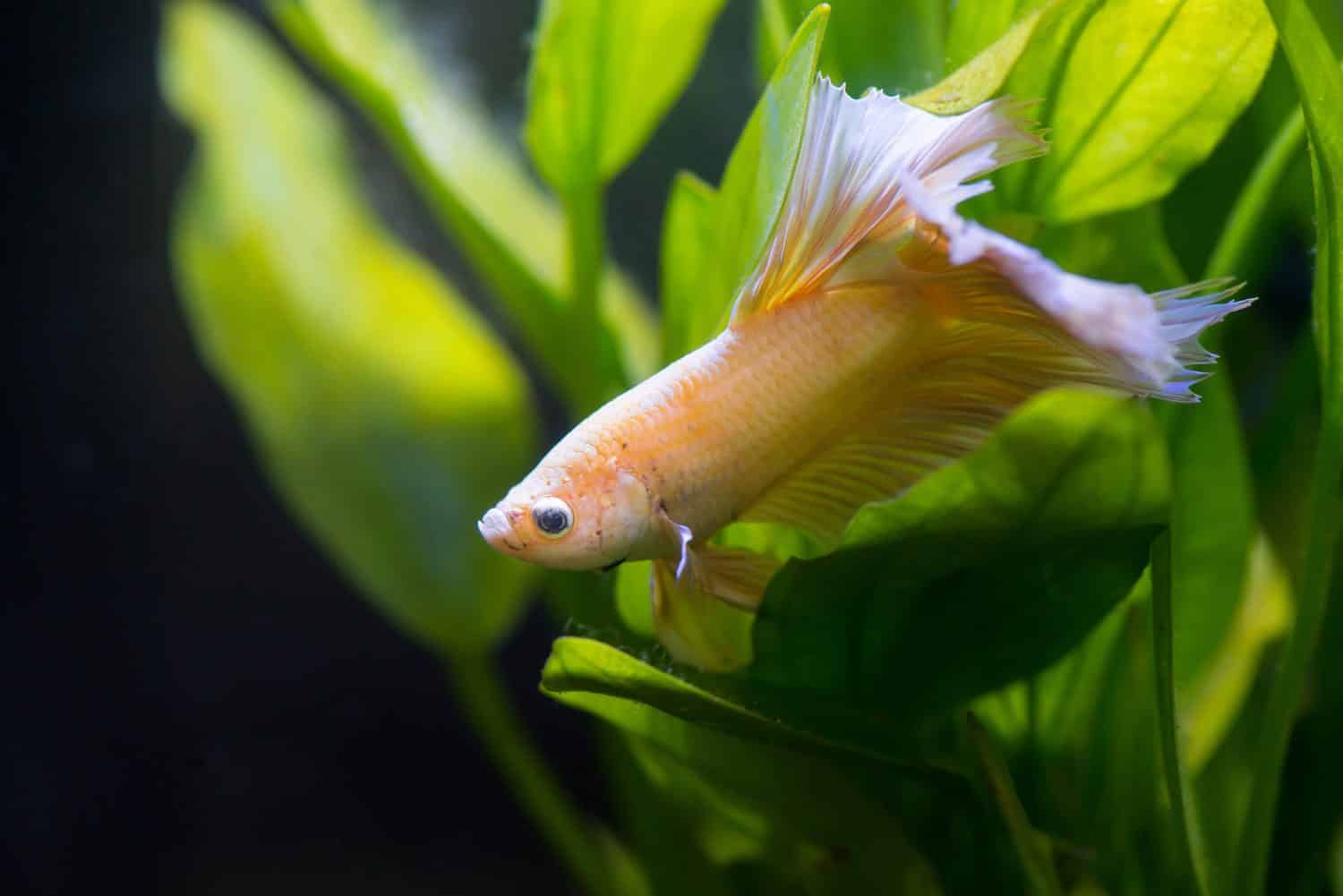
Image: ANURAK PONGPATIMET, Shutterstock
©ANURAK PONGPATIMET/Shutterstock.com
As mentioned previously, when fish sleep, it is not that similar to how humans or even other mammals sleep. Instead, when a betta fish is sleeping, it has a likeness to daydreaming or zoning out. As a result, they have reduced responsiveness to external stimuli such as movement, vibrations, and even food!
#3 Relaxed Fins
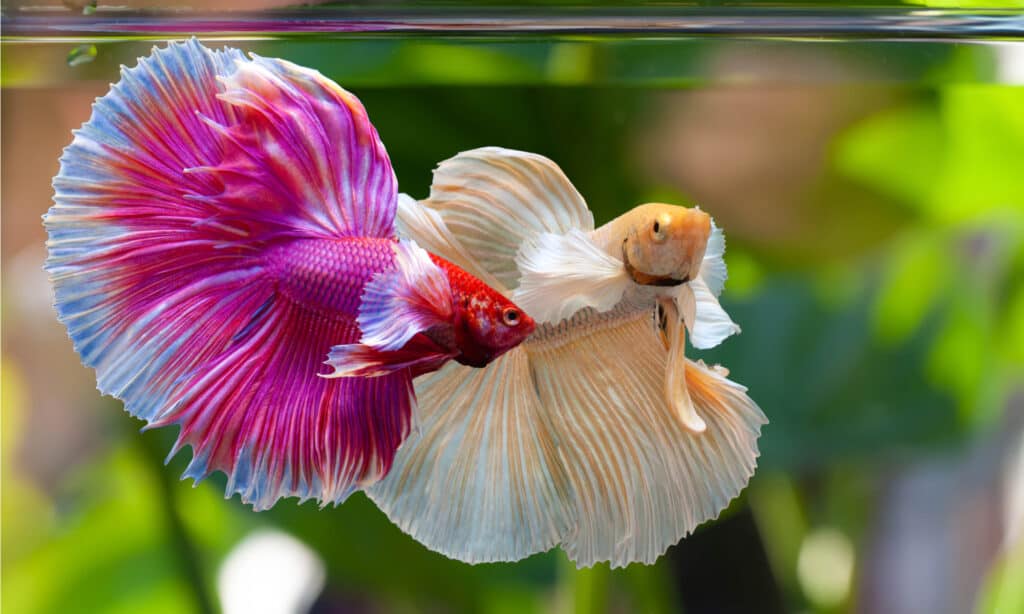
Betta fish are widely known for their flamboyant tails and fins.
©panpilai paipa/Shutterstock.com
One of the ways you can tell fish are asleep is by looking at their fins. When they are awake, you can typically see that their tails and fins are highly active. Furthermore, their pectoral fins are most active, since they are what most betta fish use to swim with. When they are resting, this movement slows and appears relaxed rather than spread out or flared.
#2 Slowed Movement and Reduced Activity
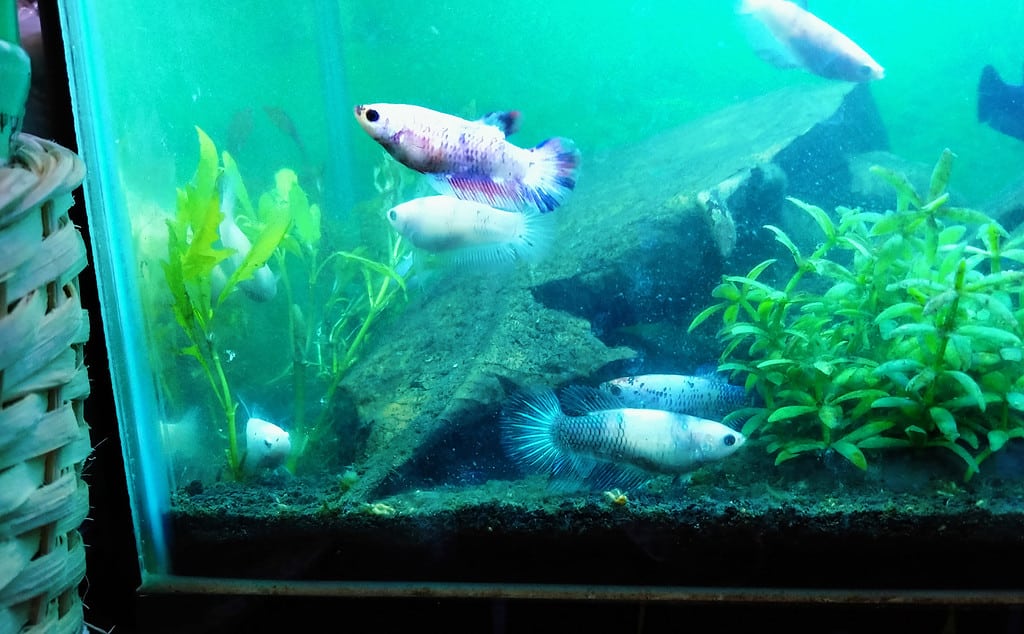
When betta fish are asleep, they typically settle in one area and stay there for the duration of their resting period.
©ailu nana/Shutterstock.com
Along with their fins being more relaxed, their overall activity is significantly reduced when at rest. As they sleep, betta fish tend to move more slowly or even appear motionless for extended periods of time. Besides that, they exhibit minimal interaction with their environment. This is another one of the best ways you can tell fish are asleep. So, if you observe that your betta fish has not moved for a long time, do not fret — they are not dead, just sleeping!
#1 Resting Position
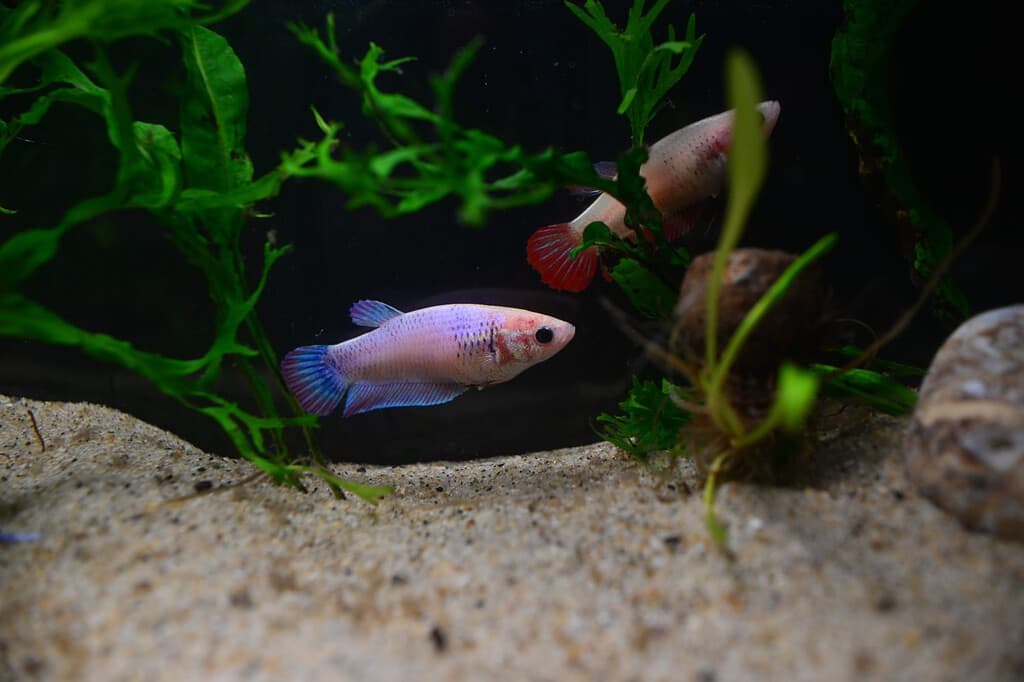
©ItsAngela/Shutterstock.com
To continue, along with slowed movement, their actual resting position is another indicator of whether your betta fish is sleeping or not. Some fish float in place, whereas others wedge themselves into a secure spot in the mud, coral, sand, or other aquarium substrate in their tank.
Alternatively, some betta fish prefer resting in what could be described as a nest. This could be any leafy vegetation in their aquarium or even a betta bed leaf hammock, which is a product that is sold at most pet stores. This product recreates the natural resting habitat that betta fish use in their natural environment. In the wild, betta fish sleep just below the surface of the water, allowing them quick and easy access to the surface to breathe. If you purchase one of these betta bed products, suction cup it close to the surface to provide the comfiest resting place for your pet betta fish!
Conclusion
To conclude, you can use these eight telltale signs to determine if your betta fish is sleeping. Nevertheless, while these are all good ways you can tell fish are asleep, each betta fish may have slightly different sleeping habits. Because of this, it is essential to observe their individual behaviors to best understand their specific sleeping habits. This allows you to accurately determine if your pet betta fish is sleeping.
Along with that, you must provide a suitable, optimized environment for your pet betta fish to thrive. This will help ensure they remain healthy, happy, and comfortable in their tank. Do your research before purchasing your betta fish to ensure you have the correct tank size and the proper accessories to better mimic their natural habitat. Furthermore, it is crucial to have the appropriate equipment to guarantee that the water temperature remains within the ideal range for your specific betta fish species. Additionally, maintaining their preferred light-dark cycle is also important to keeping them healthy and happy.
If you are new to keeping pet fish or simply looking for inspiration on which species might be best for you, check out this article outlining the most colorful freshwater fish species to liven up your at-home tank!
The photo featured at the top of this post is © panpilai paipa/Shutterstock.com
Thank you for reading! Have some feedback for us? Contact the AZ Animals editorial team.




